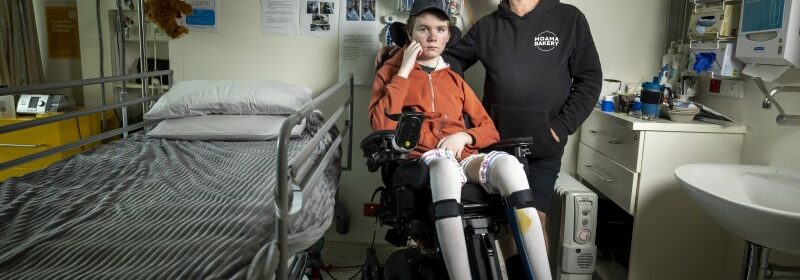Xavier has been ready to leave hospital for months. But with nowhere else to go, he’s stuck

Xavier Edwards has been stuck in hospital for 12 months and just wants to go home.
But while the quadriplegic teenager is ready to leave, a bureaucratic nightmare means there is no end in sight to his lengthy stay.
Xavier Edwards and his father, Jase, in the Royal Children’s Hospital.Credit:Wayne Taylor
Xavier is just one of about 1430 people receiving support from the National Disability Insurance Scheme (NDIS) who are stranded in public hospitals across Australia because of administrative delays and a lack of suitable housing.
The 14-year-old was airlifted to the Royal Children’s Hospital in Melbourne in April 2022 after flying over the handlebars of his BMX and breaking his spine, leaving him a quadriplegic.
In January, after Xavier had spent months in intensive care and rehabilitation, his doctors finally said he was ready to go home.
But because there is no suitable accommodation in Xavier’s home town of Echuca, in far-north Victoria, the hospital has been unable to discharge him.
The Edwards family remain in limbo while the National Disability Insurance Agency and Victorian Department of Housing stall on the approval of modified accommodation, which would cater to Xavier’s needs.
“It’s like a bad dream,” said Xavier’s father, Jase Edwards, who drives about 225 kilometres from Echuca to Melbourne every three days to be with his son, sleeping on a hospital couch.
“I would love to wake up from this and have things the way they were.”
Health experts have been calling for new financial incentives to speed up the discharge of patients from hospitals when they are ready to leave.
The Victorian Healthcare Association, which represents public health services, said some people were spending up to two years in hospitals unnecessarily.
Xavier Edwards in the ICU with his great aunt, Sandy.
The trend, which is known as “exit block”, creates delays for those who need a hospital bed and leads to overcrowding in emergency departments and ambulance ramping.
It is also expensive for taxpayers, with one day of hospital care costing up to 10 times more than community-based care, such as aged care, according to the association.
In the latest issue of the Medical Journal of Australia, Flinders University professor Tarun Bastiampillai, Victorian Healthcare Association deputy chief executive Juan Paolo Legaspi and Council on the Ageing’s Ben Rogers said Australia should learn from Britain, where local authorities must reimburse hospitals when a patient’s discharge is delayed due to issues with social services. The move that has sped up discharges.
Legaspi said: “We need our governments to come together and sort this out.
“Hospitals are doing their best to treat people efficiently so they can cut waiting times, but you can’t send people out the door if they need to move on to a rehabilitation facility or supported accommodation or aged care and there’s nothing in place for them.”
Like many Australians, Jase can’t afford to buy a home. The single father of three rents a house but it can’t be modified with ramps, widened hallways and doorways, and accessible bathrooms.
The not-for-profit Summer Foundation, which helps people stuck in hospital due to housing barriers, has identified a house in Echuca that could be modified for Xavier. This could either be bought by the Department of Housing and leased to the family or enrolled as specialist disability accommodation for the NDIS to fund. It has put these proposals to both agencies and is awaiting a response.
Jase’s frequent trips to Melbourne keep him away from his younger son, who is 12, and his eldest son, who is autistic and lives in supported disability care in Echuca. His youngest has had to move in with his grandma.
“It is terrible; it hurts me to leave them,” he said.
But he is amazed by Xavier’s resilience. “It blows me away how he handles it,” he said. “He is still the same cheeky kid – he just can’t move three-quarters of his body.”
Xavier is frustrated by the situation.
“It’s annoying,” he said. “This is all I’ve known for almost a year. I want to see my friends.”
When Jase returns to Echuca, Xavier’s great aunt, Sandy, drives from Bendigo in central Victoria to Melbourne to take his spot on the hospital couch and spends the next three days and nights with Xavier. “My auntie has put her life on hold for 12 months,” Jase said. “There is nothing I can do to thank her.”
A Department of Housing spokeswoman said it was prioritising the family’s request for accommodation and “working with several parties to find a suitable home for them as soon as possible to expedite his discharge from hospital”.
She said the government had invested $39 million this financial year towards the Pathways to Home program to help people with a disability facing discharge barriers. As part of the program, 115 people with a disability have moved out of hospital.
The NDIA was contacted for comment.
The Morning Edition newsletter is our guide to the day’s most important and interesting stories, analysis and insights. Sign up here.
Most Viewed in National
From our partners
Source: Read Full Article

